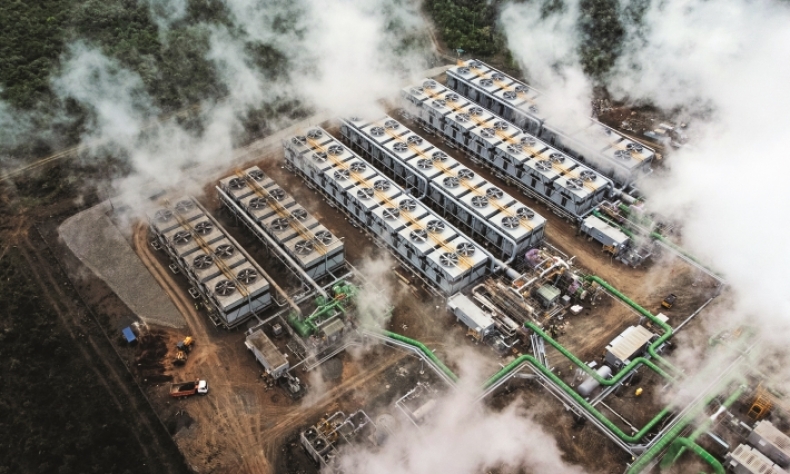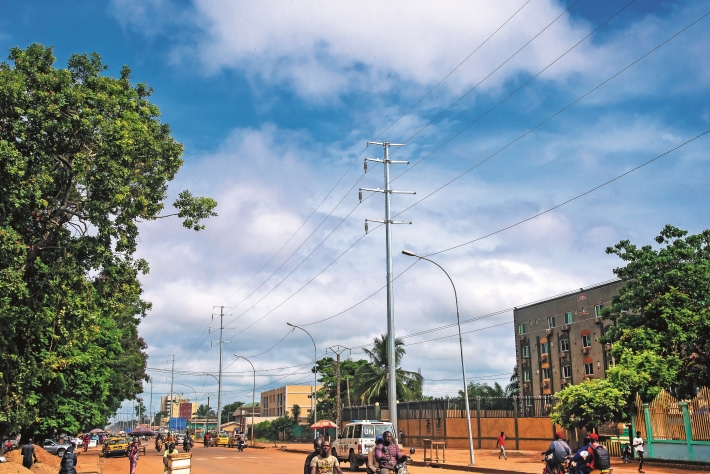Sights on Sustainability

China-Africa renewable energy investment cooperation has a long way to go, and it is crucial to establish a mutually beneficial and trusted partnership.
In the summer of 2024, many parts of the world experienced historic high temperatures, which shows that the impact and risks of climate change on the world are growing, especially for Africa. In recent years, climate-related disasters have become more frequent and severe, posing a great threat to the continent’s food security, energy security, ecological balance and socio-economic development.
At the 28th United Nations Climate Change Conference in 2023, more than 100 countries signed the Global Declaration on Renewable Energy and Energy Efficiency. It noted that according to the International Energy Agency and the International Renewable Energy Agency forecasts, to limit global warming to 1.5 degree Celsius, the world will require three times more renewable energy capacity by 2030, and must double the global average annual rate of energy efficiency improvements from around 2 percent to over 4 percent every year until 2030.
Opportunities and challenges
As a continent with extremely rich renewable energy resources, Africa has an indispensable role to play in global energy transformation and green development. According to an International Energy Agency report, Africa possesses abundant renewable energy resources, with solar, wind, and hydropower reserves accounting for 40 percent, 32 percent and 12 percent of global reserves, respectively. It is also rich in key minerals such as copper, cobalt and lithium required for renewable energy technology and applications, which is of great strategic significance for the global low-carbon transformation.
Despite its huge reserves, Africa has a lot of work to do to actually make use of these resources. Taking solar energy as an example, the African continent added just 3.74 million kw of solar energy capacity in 2023, accounting for less than 1 percent of the world’s new installed capacity. According to an International Renewable Energy Agency report, only 2 percent of global investments in renewable energy in the last two decades were made in Africa.
At the same time, current levels of climate finance in Africa fall far short of what is needed. Research group Climate Policy Initiative calculates climate finance needs in Africa to be $2.5 trillion during 2020-2030, and the total cost of implementing the Nationally Determined Commitments to be $2.8 trillion for the same period.
In order to generate funds, African countries need to actively formulate effective incentive policies, improve the business environment, optimise infrastructure construction such as transportation and power grids, and strengthen bilateral and multilateral energy cooperation.

Complementary resources
China-Africa cooperation can undoubtedly play a more positive role in this area.
In recent years, China has vigorously developed renewable energy and achieved remarkable results. The country has continuously improved the policy support system and energy planning, engaged in international cooperation and exchanges, and launched pilot projects to drive large-scale development. These measures have supported the establishment of upstream and downstream industrial chains in renewable energy, accelerated technological progress and innovation in the industry, achieved standardisation of products and production processes, and significantly reduced costs, making important contributions to the rapid growth of renewable energy in China and the world.
China has been Africa’s largest trading partner for 15 consecutive years and is also one of the main sources of foreign direct investment in the continent. Under the Forum on China-Africa Cooperation (FOCAC) and the Belt and Road Initiative, China-Africa energy investment cooperation has gradually evolved: Green and low-carbon transformation has become an important consideration for energy investment; distributed “small and beautiful” clean energy projects have received more attention, in addition to traditional large-scale power stations; investment models have become more diversified, and Chinese companies have more actively explored integrated investment, construction and operation business models; and companies are paying more attention to ESG (environmental, social and governance) management, employee localisation and integration with local communities.
The FOCAC Beijing Summit held in early September laid an important foundation for the future economic, trade and investment development cooperation between the two sides, especially in promoting the application of clean energy and achieving green development.
Local adaptation
Promoting industrial development in accordance with local conditions is of utmost importance to China-Africa cooperation. In Africa, especially in Sub-Saharan Africa, there is a huge market for the application of distributed renewable energy in agricultural, industrial and commercial fields. This requires China to adjust its investment mode of focusing on financing large-scale centralised energy projects to explore more “small and beautiful” distributed renewable energy business models and innovative financing models.
China has made remarkable progress in the field of “photovoltaic plus,” showing the diversification of innovation and application scenarios. In particular, in the field of “photovoltaic plus agriculture,” China has successfully implemented large-scale projects with a capacity of more than 30 million kw, powering agriculture, fisheries, greenhouses, animal husbandry, tea and other fields. The experience accumulated by China in the field of “photovoltaic plus agriculture” can be combined with the local resource advantages of Africa to carry out innovative pilot demonstrations in accordance with local conditions.
At present, China’s wind and solar energy industry is developing rapidly, with the world’s leading independent design and manufacturing capabilities, while promoting the continuous reduction of costs. These technologies and operational experiences can support Africa to develop green manufacturing industries that are suitable for local resource conditions and market demand.
Professional talents are indispensable for realising the above transformation. For the training of professional talents, China can develop special training courses in a targeted manner to improve the skills of local workers, especially in installation, maintenance and operation of renewable energy projects and systems. China and Africa can strengthen cooperation in education and vocational training, especially to help young people and women to build capacity, promote gender equality, and encourage young people and women to start businesses.
China-Africa renewable energy investment cooperation has a long way to go, and it is crucial to establish a mutually beneficial and trusted partnership. A good partnership is also beneficial for Chinese companies as it can help them to gain better understanding of market demand, better handle differences in culture and business practices, and improve local integration.
The author is Research Associate of Sustainable Transition Centre-Energy Programme, WRI China.
 Facebook
Facebook
 Twitter
Twitter
 Linkedin
Linkedin
 Google +
Google +










